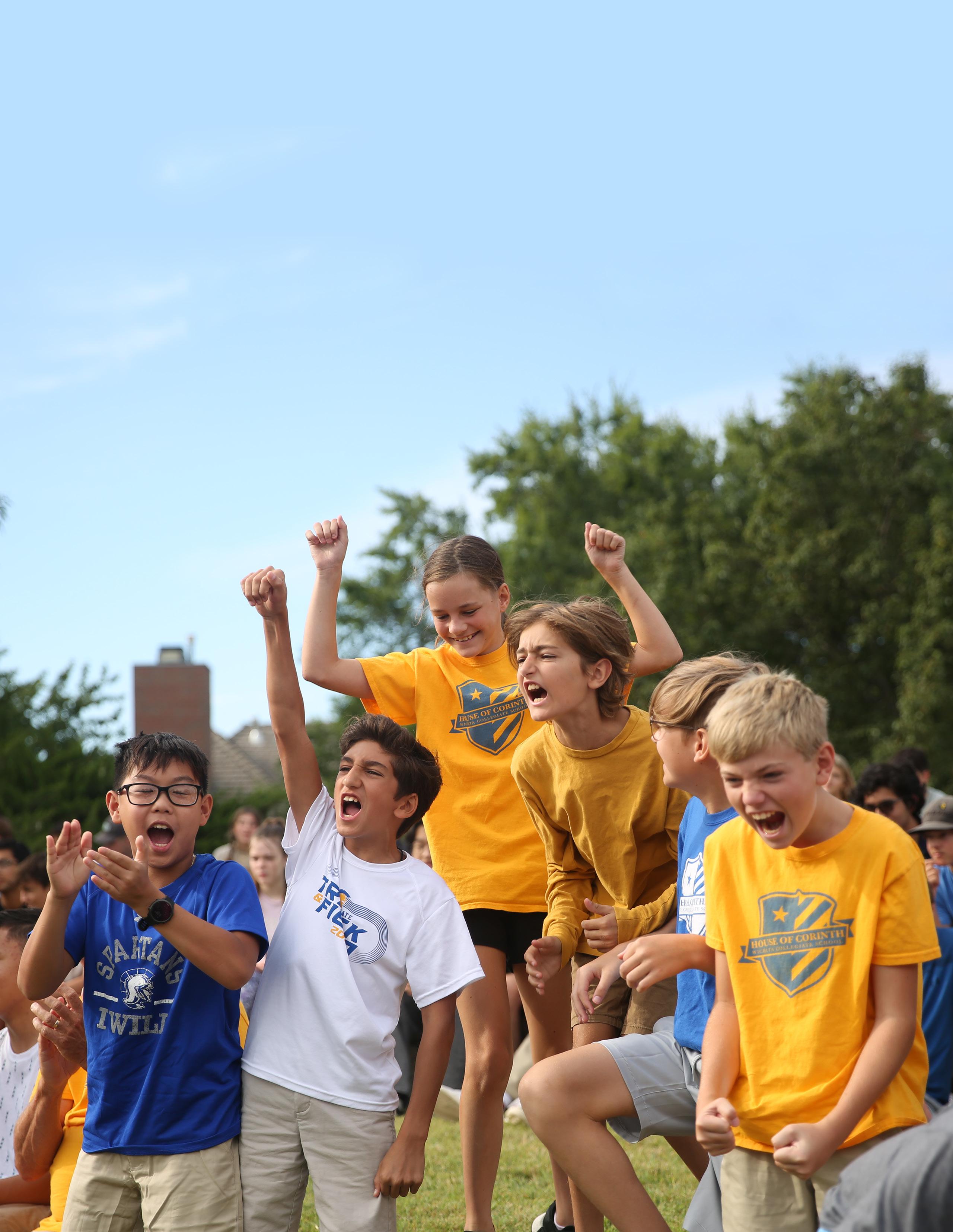

FALL 2022
Connection is published by the Office of Advancement
On The Cover Front: Middle School students thoroughly showcasing their school spirit and excitement for what is to come this year during the back to school assembly.
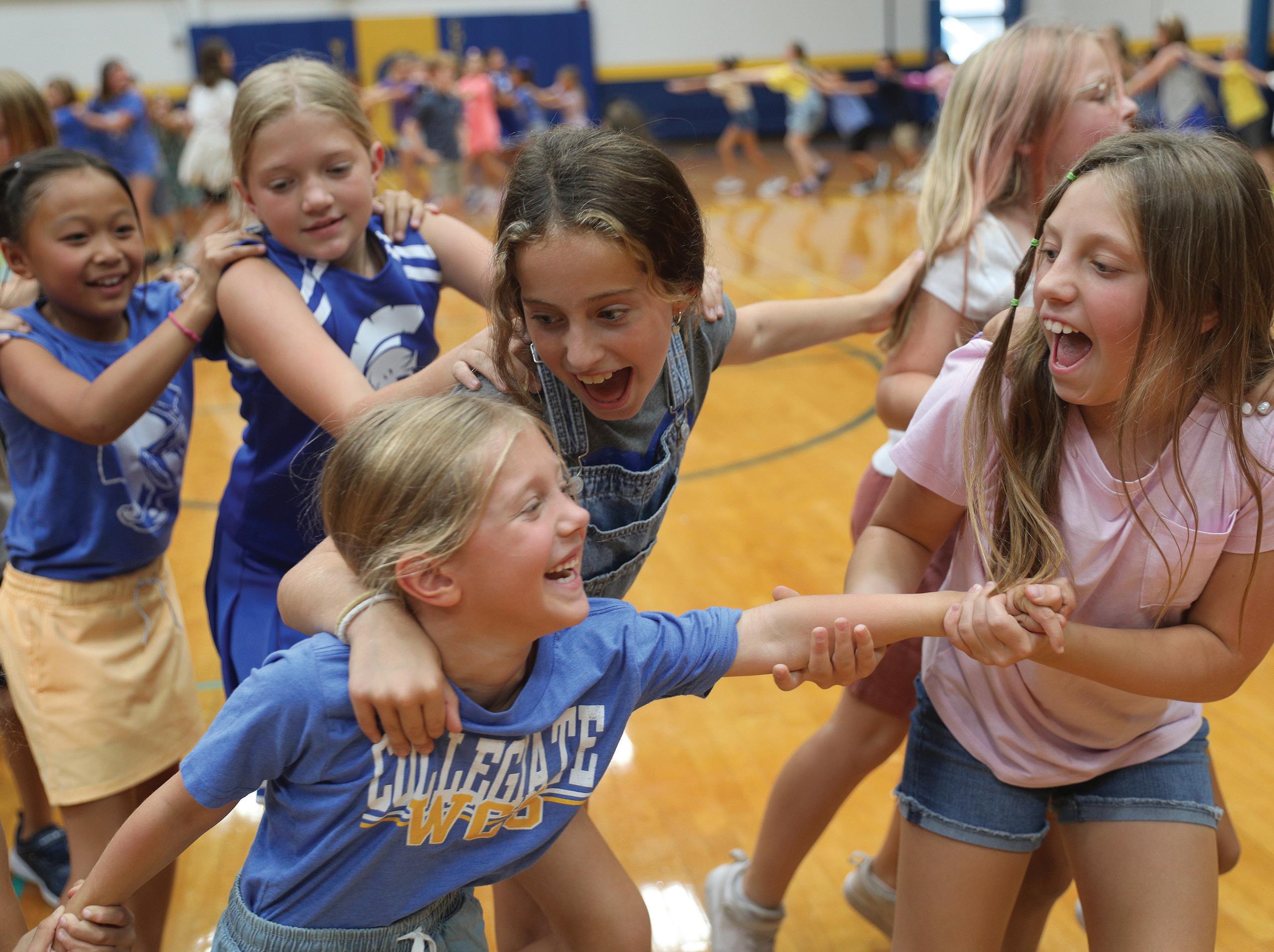
Back: Aerial photo of the returfing of Shawver Field, during the summer of 2022.
Contributing Writers Chris Ashbrook, Sarah Myers, Charlie Ramseyer, Kathy Rukes ‘99, Lalo Walsh

Contributing Photographers Amy Cunningham, Steve Naumann, Charlie Ramseyer
Editorial Staff Chris Ashbrook / Director of Advancement, Sarah Myers / Alumni Relations & Events Coordinator, Steve Naumann / Director of Marketing & Communications, Bethany Phelps / Advancement Services Coordinator, Charlie Ramseyer / Communications Assistant, Kathy Rukes ‘99 / Director of Enrollment Management, Lalo Walsh / Assistant Director of Development
Mission Statement Wichita Collegiate School exists to inspire all students to be the best versions of themselves through a transformative education grounded in academic excellence within our inclusive community.
Vision Statement Wichita Collegiate School empowers all students to lead lives of impact by partnering with our students, faculty, families, and community.
wcsks.com
Lower school students getting in the spirit with a conga line around the gym during an end-of-the-week assembly.
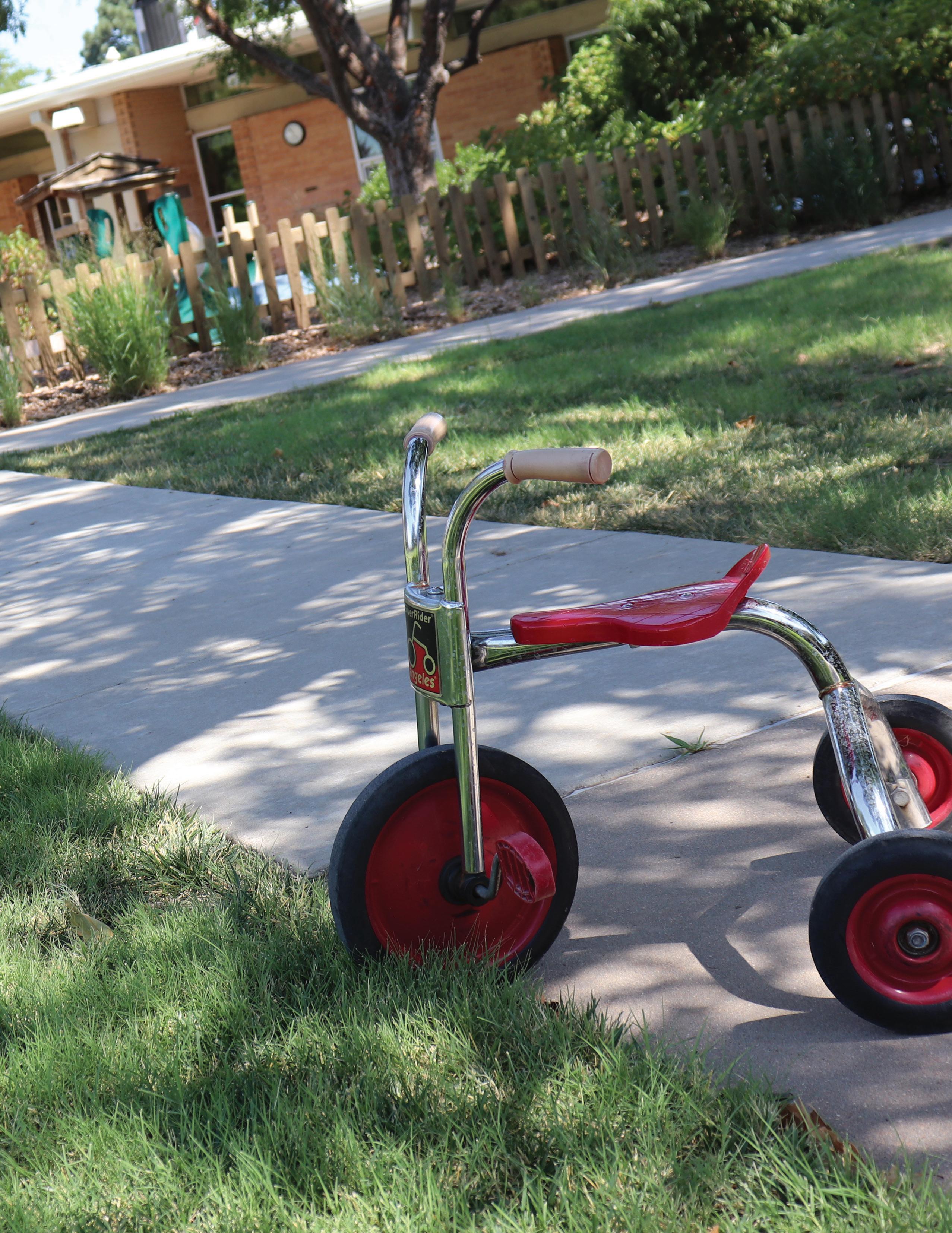
Contents 2 LETTER from the HEAD of SCHOOL 6 ALUMNI Spotlight 8 FINE Arts 12 CHICKEN or the EGG? 4 FOR the LOVE of Books and KIDS 14 ONCE a SPARTAN...
Letter from the Head of School

Dear Wichita Collegiate School Family,
We are excited to share with you our Fall 2022 Connection magazine. In the following pages, you will have the opportunity to read about numerous ways our school defines itself and truly what it means to be a Spartan.
Back in 2019-20, which was my first year at Collegiate, the question of “Who is a Spartan?” was a cornerstone of our work as I got to know the school community and they also got to know me. The result of the many conversations I had was our new mission system that included the “Who is a Spartan” series of statements.
Those statements can now be found posted all around our campus and in every classroom. They act as a guiding star to our work and have helped us through many of the challenges of the past three years. They also help us to look to the future and initiate conversations about how best to facilitate the skills and traits we want to develop in each of our Spartans. Decisions about schedules, new programs, and instructional methods are centered around how best to deliver on the promise to create those traits.
Every day as I visit classrooms, walk hallways, and meet with our community, I see our work in action and recognize the progress we are making. This is a school where amazing things are happening every day. It is a true privilege to observe our outstanding educators and students in action.
When I talk to our teachers, they are particularly drawn to the features of creativity, experimentation, and compassion in our “Portrait of a Spartan.” When I speak to our students, they repeatedly mention how much they appreciate the fact that they can lean on and support each other and that they are challenged to be better by their peers.
Reflecting on the question “Who is a Spartan?” can lead down many paths. What is consistent in those reflections is that they all are directed towards constant improvement and equipping our Spartans to lead lives of impact.
Enjoy the examples of the wonderful work going on within our school in the following pages. From the arts, to alumni, to chickens - there is something for everyone.
I am proud to be a Spartan!

Best regards
Nathan Washer Head of School
2
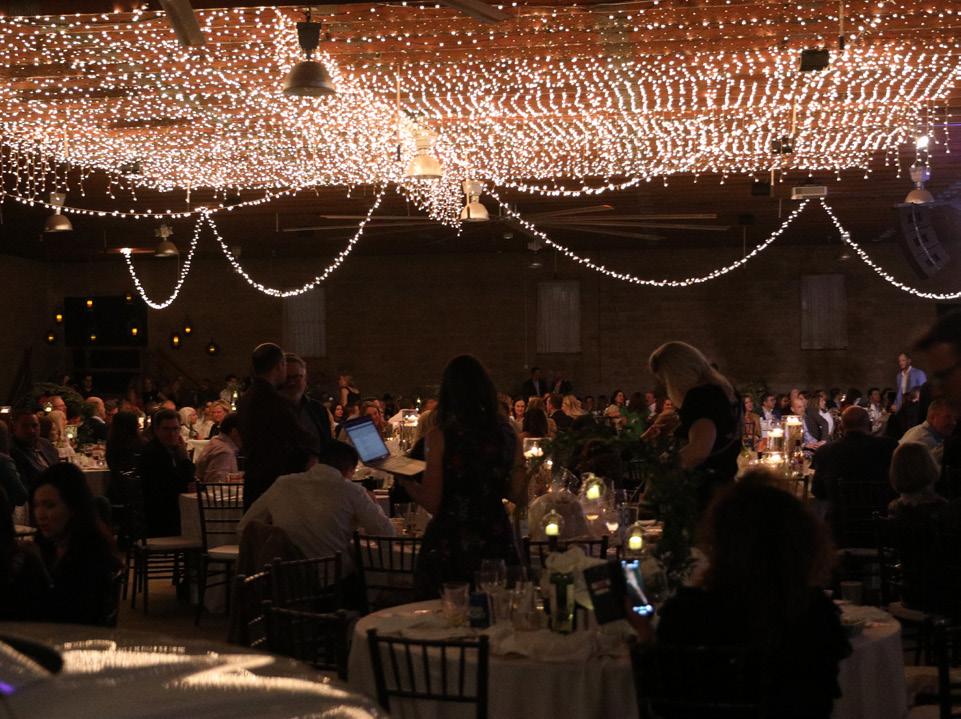
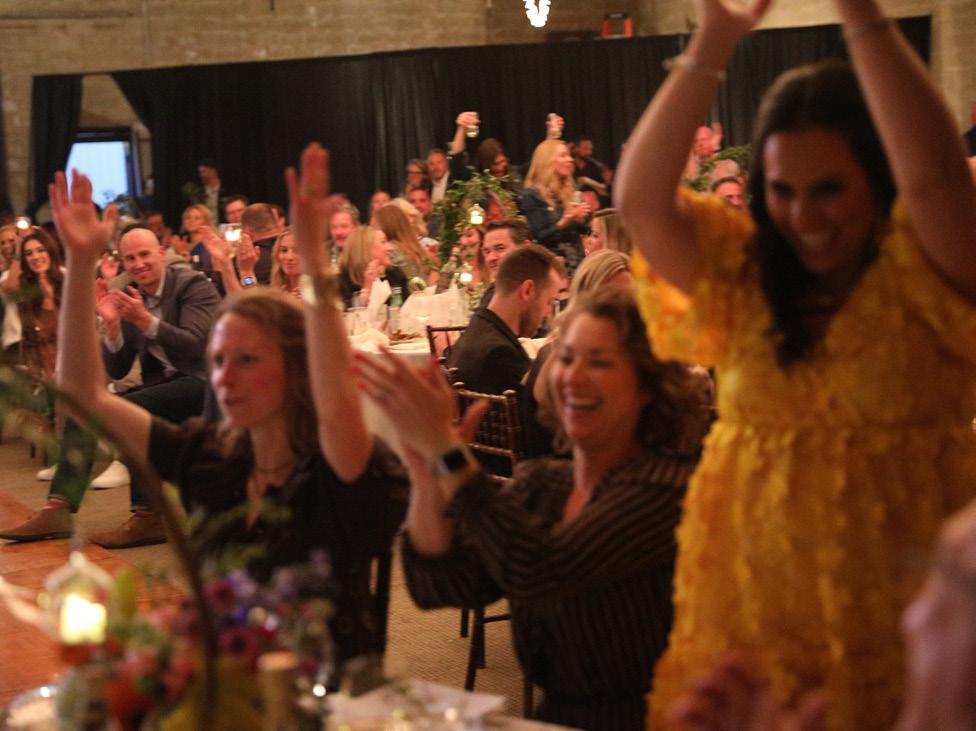
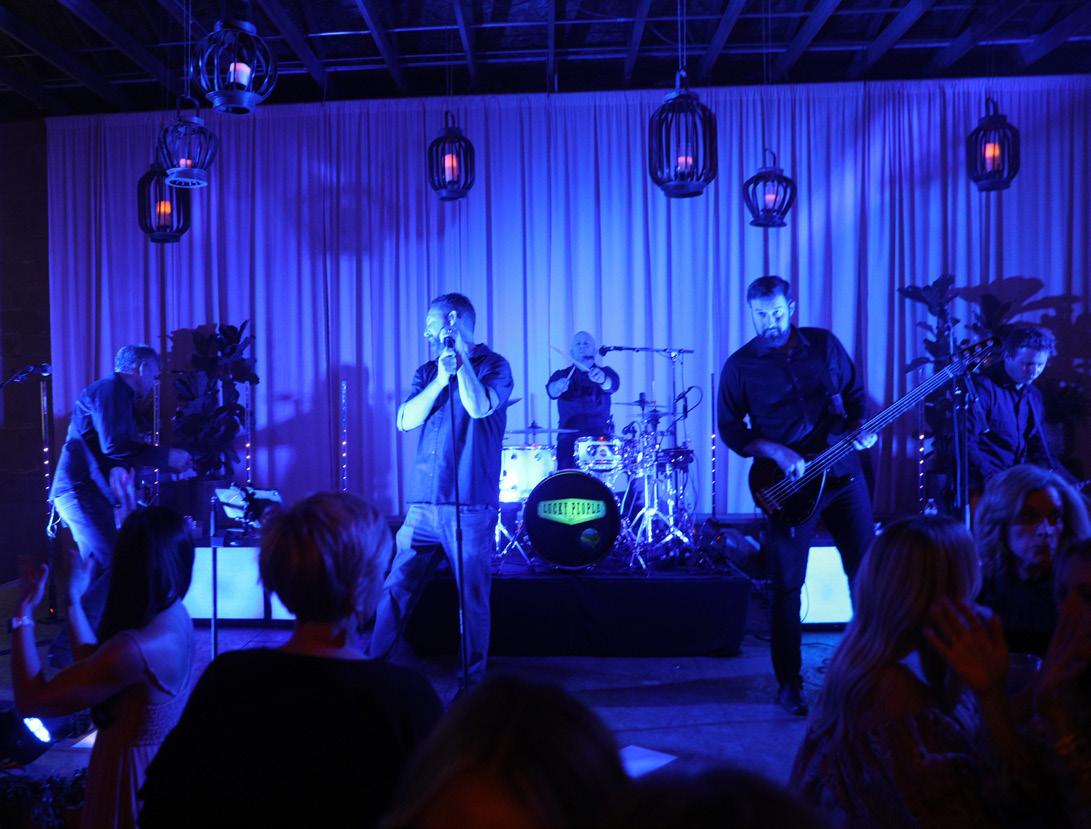
3 5:30 pm / April 22, 2023 / Murfin Stables Mark Your Calendar Mark Your Calendar WCSKS.COM
For the Love of Books and Kids
How Patti Yetter cultivates a love of reading in students of all ages.

 by Charlie Ramseyer
by Charlie Ramseyer
Any student who has journeyed through Wichita Collegiate School for any length of time knows that reading is bedrock to our educational experience. As a school, we work hard to create a love of reading in our youngest Spartans that carries through to our oldest. And our Librarian Patti Yetter is there for the journey from the start.

When I asked Mrs. Yetter what led her to her current role as the Early Childhood and Lower School Librarian, she glanced around the Sheldon Coleman Library with such love in her eyes that I almost thought that was her answer. But then she looked back at me and said, “I love books and I love kids.” And with Mrs. Yetter, you quickly know, it truly is that simple.
Mrs. Yetter’s first association with Collegiate actually came as a parent. Her son, Jansen, started attending in the 4th
grade, graduating in 2008. As she watched him grow up on our campus, she saw the pieces of the school that make it such a wonderful place, while acknowledging that even in this special environment, many of our students are still looking for their own special place here. After joining the faculty as a 2nd Grade teacher in 2015, she made it her intent to create that space for them. She first joined the faculty as a long-term substitute for
4
2nd Grade in 2014 and never left. After being in the classroom for four years, a colleague encouraged her to look into a librarian position that would be opening the next year. After learning that the new role meant there wouldn’t be an Early Childhood librarian, she quickly figured out a schedule that allowed her to work with kids in both the Early Childhood and the Lower School. With books in hand, she hit the ground running and hasn’t looked back.
Mrs. Yetter visits our two-year-old Great Beginnings students every week for their own version of library time in their classrooms. Beginning at three years old, our preschool and prekindergarten students visit the Jenny Paulseen Early Childhood Library once a week. After reading them a story, Mrs. Yetter engages the kids with activities such as retelling the story, sequencing, character recognition, and more. It is these comprehension skills that ultimately build the foundation of a good reader.
It isn’t just the younger kids who get the privilege of being read to each week by Mrs. Yetter. In fact, our fourth grade students still take their seats in the Leslie Prechtel Reading Room just like they did as first graders eager to hear the next story Mrs. Yetter has to share.
Mrs. Yetter lights up when she starts talking about kids taking home books from the library. She works hard to curate a collection of books that speaks to a variety of interests and excites each and every kid when they walk into the library. She knows this is
where it really starts, the true LOVE of reading. From our kindergarten through our 4th graders, Mrs. Yetter encourages the kids to check out books that spark their excitement. She is quick to emphasize that even if kids pick something beneath their reading level, the real importance is that they develop a lifelong love of reading by finding a book they can’t wait to crack open. She delights in watching the kids squeeze in those first few pages as they wait in line or on the walk back to their classroom.
As we watch our students grow up on campus, we see their love of reading grow as well. And certainly the Collegiate library program, under the care of Mrs. Yetter and supported by all of our teachers, facilitates that lifelong love of reading.

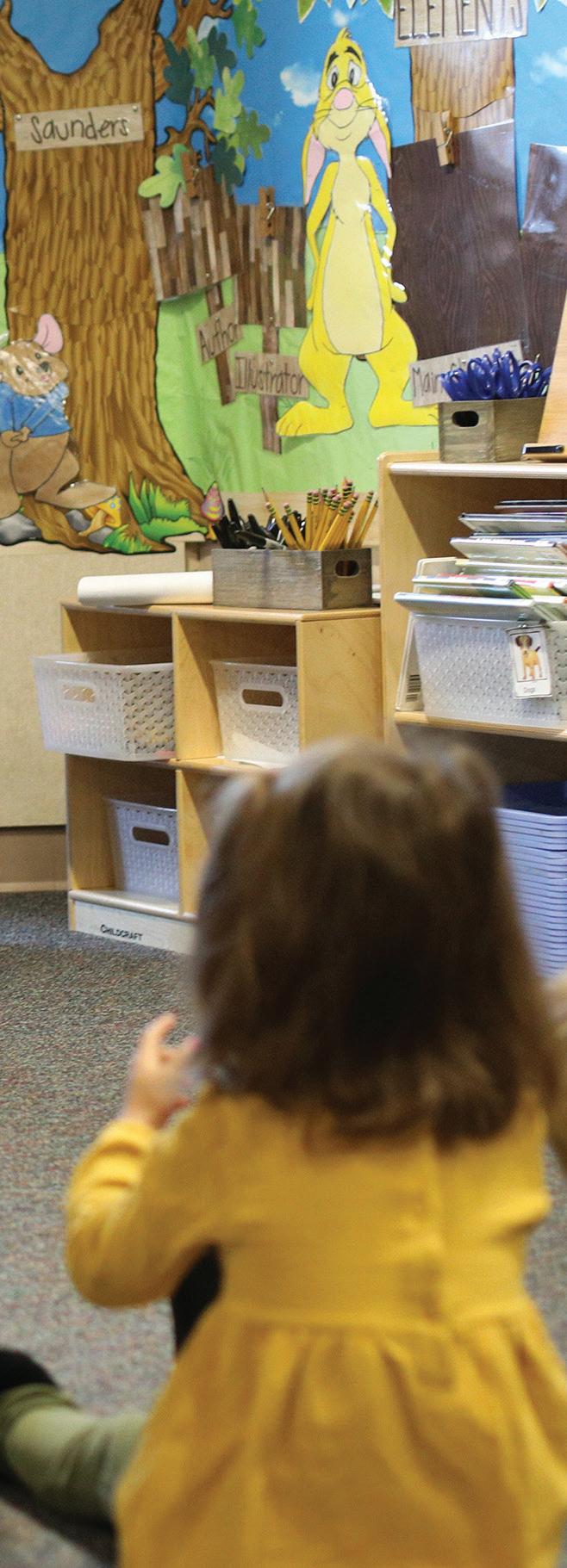

Regis Fox, is launching the tennis ball down the court to his doubles partner. As they challenge and encourage each other, they aren’t training for a specific tournament, they are just “putting in the work,” of consistent practice and dedication to their sport. Regis, the Director of Tennis at Crestview Country Club, is used to long hours on the tennis court, both practicing and coaching. As we talk, Regis looks down at his wrist to the Collegiate bracelet with the motto, Proba Te Dignum— Prove Yourself Worthy.
Prove Yourself Worthy has become a guiding mantra for Regis. In his life as a husband, father, tennis player and coach, he shows up everyday to prove himself. He says, “Sometimes it’s exhausting, but it’s just what I do.” Regis attributes this inexhaustible work ethic and drive to his grandmother. Fox’s grandmother raised him to always give 110 percent effort. Regis said that
By Sarah Myers
“lifer”, someone who started Collegiate at age 3 or 4 and continued until graduation, Regis felt that he was raised in two different worlds. Regis grew up in a neighborhood just a few miles west outside the Collegiate bubble. Regis’s mom made many sacrifices for him to be able to attend Collegiate, and he always wanted to make his family proud. He was able to navigate the different worlds he inhabited because of his grandmother, mom, and great aunt. They always had open and honest communication in their home and his eyes were open to a variety of diversity from a young age. He said this was really valuable for him in being “down to earth.”
Regis’s most memorable time at Collegiate was during his years in
at age 7 or 8, he would mow the lawn without being asked, but just because that was what he was supposed to do. His grandmother helped to instill in him early a mindset that “you always do hard things. You don’t give up. You just do what is necessary to prove yourself.”
Regis is a natural introvert. Especially when he was young, he sat back and observed the world around him. This attribute has helped him to navigate and interact well with a variety of people. “I learned that you talk differently to a kid in the neighborhood than you do to one of your teachers at Collegiate.” Even as a Collegiate
the Upper School. It was then that he really found his voice. He loved his experiences playing tennis at Collegiate, especially his senior year when the tennis team moved from 3A to 4A division, and he was able to compete in the State Championship. After graduating, Regis went on to play tennis at Newman University, and took a short break from being a studentathlete to attend the University of Kansas for one year.
Regis started coaching tennis professionally in 2011. As a tennis coach, his goal is to have a significant


 REGIS FOX
REGIS FOX
6
This beautiful fall afternoon,
impact on people’s lives by treating everyone as unique. He recently had an old student reach out on social media and share the impact that he had on his life. “People don’t forget when you truly touch their lives.”
When he isn’t coaching, playing tennis, or involved at Collegiate, Regis enjoys spending time with his wife, Mindy, and his 2 daughters, Adrielle, 11, and Camryn, 5. He says Mindy supports him in whatever he does as long as he communicates openly with her. He acknowledges that he would not have been able to accomplish everything that he has without “her support and holding down the fort at home,” saying, “Mindy, helps to balance me out.”


In 2020, Regis decided it was time to get more involved with Collegiate again. “All over the country, companies and organizations started to be more mindful of how they were showing up.” With the support of several alumni, Collegiate started to do the same. A fellow alumnus reached out to Regis, asking if he would like to get involved
with the Alumni Board. Regis feels that his “voice speaks for lots of the black kids at the school.” He says during his childhood people just accepted that injustice “is what it is,” but with the advent of social media, people are now more aware of the wide array of
over time. When he graduated in 2004, students of color comprised 16.6% of Upper School students and 18.3 % of the students in grades 1-12. Now, students of color comprise 37.2 % of Upper School students and 33.1 % of students in grades 1-12.
differing human experience and more mindful of the role that institutions play in either limiting or providing opportunity. As Regis is happy to note, Collegiate has become more diverse
As the President-Elect of the Alumni Board, Regis is passionate about working with High School students to help broaden their horizons and to encourage them to consider how they present themselves in the world. He knows that there are many kids who are like he was: “smart, ambitious, and motivated enough to be successful at Collegiate but unable to attend because of financial reasons or because the bubble just hasn’t expanded wide enough for them.” Regis says that he is starting to see a broader range of faces at Collegiate, especially in the Upper School and that he looks forward to using his perspective and voice to help Collegiate continue to expand its reach and ensure that its many different students thrive.
7
“
Art washes away from the soul the dust of everyday life.
”
-
Pablo Picasso
It is a weekday just like any other. At 2 in the afternoon, the Collegiate Upper School Commons is scattered with students; some intently hunched over their laptops or poring over books, others chatting quietly, their hushed voices a soothing baseline hum. And then, from a corner of the Commons, like the sound of a gentle rain, comes the pitter pat of snaps and claps followed by a chorus of young voices, their music, as it travels the hallways, a tranquil soundtrack to every student’s afternoon.
Such is the nature of fine arts at Collegiate’s Upper School. From the walls that lead into Matt Webber’s vocal music room and line the Commons burst the vivid colors of artwork produced by Marilen Morales’s drawing and painting students. Displayed throughout the building are the works of Amy Cunningham’s photography students and Megan St. Clair’s printmaking, fiber arts, and sculpture pupils. During any given school day, if one isn’t overhearing the dulcet tones of one of Matt Webber’s vocal music groups, there is likely a happy clamor of instrumental music emanating from Troy Fischer and Sam Hake’s band room.
Our Upper School boasts 14 visual arts classes, 2 choirs and 5 instrumental music groups performing collectively over 70 times a year, and a fine arts faculty team that together support two major theater productions annually. As a testament to the appeal of recently expanded course offerings, 60% of this year’s seniors have completed 3 years in a fine arts class. Our upperclassman choir, Madrigals, has traveled to Italy, Paris, and New York, and every Upper School fine arts student is invited to attend the annual ISAS festival, a three day long opportunity to share their creativity with like-minded young people from 40 Southwestern schools. Last year’s musical, Legally Blonde, earned WCS 2 Jester Award nominations and 12 regional honors. During the 2021-22 school year, our Marching Spartans and Drumline were both awarded coveted “I” ratings. Eighteen of our band musicians were named All-District and 10 were further honored as All-State. Forty two of Collegiate visual arts students were presented with Scholastic Art Awards, five of them earning Gold Keys and 10 earning Silver Keys. These are impressive and exciting facts and statistics, but they are actually not at all at the heart of why we continue to foster fine arts at Collegiate. There are other far more compelling reasons.
Over the course of 15 years, Troy Fischer and Sam Hake have expanded our instrumental music program in every way possible. Since 2008, when Mr. Fischer and Mr. Hake first came on board to lead only 20 players, our band program has grown to consistently engage 50 students a year for the past 10 years. But if you are familiar with our Upper School “Band Fam”, you’ll know the headline is not the numbers – it’s the vibe. Current senior AJ Nagabhushan has been a band member since 5th grade and credits Band’s warm, friendly environment and emphasis on collaboration with both expanding her social circle and laying the foundations of her closest friendships. Mr. Fischer affirms this sentiment saying, “Outside of learning individual notes and rhythms, students must learn how to work towards a common goal, learning flexibility, compassion, and support for others... teamwork, respect. When

“Music is the universal language ...it brings people closer together.”
- Ella Fitzgerald
Story by Lalo Walsh
Making the most of every space, Sam Hake works with the brass section of the band in the hallway during class.
all of that is in sync, the beauty of the music being performed can be an overwhelmingly positive aspect of their lives.” There is no doubt that our music program produces not only talented musicians, many of whom are performing at levels that render them highly desirable college applicants, but also authentically engaged community members who are comfortable bridging differences through music.

her time as a fine arts student at Collegiate as formative. She recalls the breadth of visual arts classes offered as eye-opening, each new medium offering an opportunity to experiment creatively and take risks from which one could learn and grow. What she learned from her time studying the visual arts in our Upper School went far beyond the artistic skill so clearly on display in her current photographic works. “I appreciate so much that I had an intellectually challenging education that also fostered creativity. Art teaches kids to be cultural producers, as they are asked to think about current events or politics and consider art as a means of not necessarily solving the problems, but bravely asking the questions.”
that can help its students develop the kind of independence, confidence, and conviction useful in every facet of life.
Rose Cunningham, a WCS alumna and “lifer” would agree with these sentiments of Mr. Warhol’s. Currently a senior focusing on photography and writing at the School of the Art Institute of Chicago, she remembers
Marilen Morales, having taught 2D art at the Upper School for 13 years while building out a now robust digital art program, concurs: “A strong arts program provides meaningful opportunities for kids to use their imagination, to showcase their talents, to be known. . .and to be challenged.”
It is this critical feature of the arts, that one’s work will ultimately be displayed, discussed, and perhaps even judged,
Let us return to Matt Webber’s vocal music room. And let’s really think about what’s going on in there. This is high school. The ups and downs are pronounced and come a mile a minute; one is not always in the mood to sing. But every day, that’s what our Dynamics and Madrigals do. The room’s atmosphere will often shift briskly back and forth from that of intense concentration as the group learns a new harmony to jubilant celebration as a practiced song suddenly surpasses expectation. It is a place where senior Ovi Davis, a seasoned photographer but newcomer to vocal music, says “I can break out of my shell and recharge my energy.” Longtime choir and musical cast member Shelby Lair, who
Broadway in Blue Jeans has become a highlight for many and stands as a kick-off event for the performaces for the year.
“Don’t think about making art. Just get it done. Let everyone else decide if it’s good or bad, whether they love it or hate it. While they are deciding, make even more art.”
10
- Andy Warhol
“I don’t sing because I’m happy. I’m happy because I sing.”
- William James
performed as Sandy in Grease this November, feels the same way. “People sometimes say to me, ‘How do you do that? How do you get up and sing in front of all those people?’ I mean, don’t get me wrong, you’re nervous in the beginning. But then it just becomes... fun.” For many students, art can be not only an outlet but also a restorative, their fulfillment from its daily practice showing just as much on their faces as on the canvas or stage, its comfort seen in their eyes as much as it is heard ringing through our halls.
Through the years, WCS has been home to courageous fine arts instructors who founded the programs we continue to grow today. From Gary Buettgenbach’s profound impact on our visual arts offerings to the world class Collegiate choirs that thrived under James Ockerman, our school has been the frequent beneficiary of faculty with vision. Today, this legacy holds strong. Sam Hake, in his first year as Fine Arts Director, hopes that during his tenure the Fine Arts Department will continue to present students with new ideas and classes while always upholding the standards of its past.


In the spirit of recognizing and celebrating the trailblazers of our rich fine arts heritage, a WCS Fine Arts Hall of Fame is being developed (see more on page 17). For it is so often in celebrating the achievements of those who have come before us that we are spurred to follow our own daring dreams. And while not every Collegiate fine arts student will pursue art as a vocation, there will come a time for each one, in whatever walk of life they choose, to push past fatigue and pick up the brush, to quell their fear to take the stage, and to seek joy as they lift up their voice.
From the amazingly detailed sets, to the incredible musical performaces, the US Musical, GREASE, was one for the ages.
 Marilen Morales’ students’ display of multi-media artwork in the upper school commons.
Students in Megan St. Clair’s Fiber Arts class develop work to submit to Scholastic Art & Writing competition.
Marilen Morales’ students’ display of multi-media artwork in the upper school commons.
Students in Megan St. Clair’s Fiber Arts class develop work to submit to Scholastic Art & Writing competition.
“Creativity takes courage.”
- Henri Mattise
by Kathy Rukes ‘99
Which came first: the chicken or the idea to donate the eggs from the chicken?
One of the most timeless spots on our campus is the Bunny Hill Quad. As the heart of our campus, it is often filled with Early Childhood students joyfully playing at recess. Their laughter greets passers-by as older students hurry from one class to the next. Recently, though, an unfamiliar noise has been heard emanating from a corner in the Quad: the gentle clucking from Ronnie and Chip, two chickens raised and cared for by our 5th grader students.
Hatched during the spring semester of 2022, Ronnie and Chip represent the beginning of a new fifth grade chapter of learning. Centered on hands-on, integrated learning, the new farm interdisciplinary unit is the result of years of planning and preparation by the fifth grade teachers. In its inaugural year, students had a front row seat to
watch an egg hatch and grow from chick to chicken. Of course, those growing chickens needed a good home (other than Mrs. Fiegel’s classroom), and so our iLab students got to work.
The challenge of designing a suitable chicken coop was presented to our 7th and 8th grade TinkerLab students. Utilizing their 3D design software, students collaborated on blueprints and then presented their models to a team of judges. The best elements presented by those models were blended into a new set of blueprints, which were then handed off to the 5th & 6th grade WoodLab students.

Under the supervision and direction of iLab instructor Joe Gehrer, students and staff got to work and built the newly hatched chickens a beautiful home.
Beyond learning the science of hatching and raising chickens, several students took a keen interest in the well-being of the chickens, overseeing their feedings and collecting their eggs. The care for Ronnie and Chip naturally passed to the next group of 5th graders as
Kinley Hobart took over care during the summer. If you happened to be on campus in June or July, you likely saw Kinley near the chicken coop making sure Ronnie and Chip were fed and collecting any eggs they may have laid.
As the current fifth graders prepare to hatch the next set of eggs, the fifth grade teachers are looking forward to incorporating even more levels of learning into this year-long interdisciplinary unit. In English, students will expand their writing skills by crafting chicken editorials, designing cartoons, and helping to write a manual detailing how to care for chickens. In Literature, students will read Love, Ruby Lavender, a tale of a spunky nine-year-old’s memorable summer
filled with life lessons and, of course, chickens. As they prepare to welcome even more chickens onto campus, students will put their math skills to the test by designing an enlarged pen. And in history, as students chart world
exploration and the founding of our country, they will take time to study the history of the domestication of animals and the impact that played on communities.
But the heart of the unit lies in the field of science. In reflecting on the purpose behind the unit, 5th grade science teacher Joel Walker shared, “We have been talking about this chicken project for quite a few years. The question was always how to work it into something more meaningful than just hatching some eggs...an activity done all over the United States. Eventually we hope to have kids ‘work the farm’ and learn skills that may be transferable to the rest of their lives.” In science class students will be challenged to ask questions such as: What conditions are needed for chickens to hatch? How do chickens interact with their environment? What role do chickens play in fertilizing the plants around them? How can these lessons be applied to sustainable farming practices on earth and even as we explore outer space? The fifth graders will tackle all of these questions and more as the year unfolds.
In addition to the classroom learning, collaborative opportunities across campus and our community abound in this interdisciplinary unit. Beginning last year,
the 5th grade teamed up with the Lower School in their community impact theme of food insecurity. As Lower Schoolers helped to cultivate the many gardens across campus, 5th graders collected the eggs produced by the chickens. The food was then donated to Union Mission Rescue to help feed local communities in need. Early this fall preschoolers made a short field trip over to the coop to learn more about the chickens. The


hope is to expand these cross-divisional learning experiences to empower our older students to educate our younger ones about farming.
As the fifth grade team of teachers look toward the future, they hope to add rabbits, grow even more vegetables, and even possibly add a small pond with native grasses. Fifth grade literature teacher Mrs. Fiegel stated, “Ultimately, our hope is to offer opportunities to our students that they otherwise would not have had the chance to experience.” Since so many of our students grow up in a more urban setting, this unit of study provides them the opportunity to explore a whole other side to our world as they investigate both farm life and food sustainability, all while learning valuable life skills they can carry with them long after their fifth grade year.
ONCE A SPARTAN...
ONCE A SPARTAN...
14 6
I was able to interview these alumni faculty for this article. While I did not ask those interviewed for this article if this was part of their motivation for choosing their career path (maybe I should have), I would, based on what they shared with me, contend that it influenced their decision to return to Collegiate to teach, even if that statement wasn’t a part of the mission when they attended.
By Chris Ashbrook
In our Early Childhood Division Haley Schwindaman ’12 daughter of Middle School English teacher Laura Cusick ’88 teaches kindergarten. Joining Laura in the Middle School are counselor Heidi Holton ’11, Learning Specialist Shannon Flack ’99, and Innovation Lab instructor and State Champion Baseball Coach Joe Gehrer ’02. All three of which have parents who have been or currently are faculty members. In the Upper School, Debate teacher Rob Egan ’13, Biology teacher Danielle Gerstner ’09, Chemistry teacher David Trombold ’71, Geometry teacher Jack Stewart ’13, and French teacher Brooke Finan ’92, whose mother Barbara Stokley was an esteemed member of our faculty, all carry on the tradition of academic excellence at Collegiate. In addition, Kathy Rukes ’99, daughter of former faculty member Charlo Talbot, works tirelessly as Director of Enrollment, and her brother Joe Talbot ’96 has been a longtime coach at the school. Rounding out this list of exceptional individuals is class of 77 grad Kevin Reed who has guided us as Director of Operations although he served the faculty in other roles over the years.
Upper school Chemistry teacher, David Trombold ‘71 shows his Spartan pride off to his upper school chemistry students

Jack Stewart ‘13, upper school geometry, shares a story with eager pre-k students.
No doubt inspired to understand this phenomenon by the recent photograph of alumni children currently attending Collegiate, a staggering 125 students, I sought out our alumni faculty. Is this type of devotion to one’s alma mater seen in Independent Schools around the country? While it isn’t uncommon (although very rarely at the same percentage), it warms my heart knowing that Collegiate truly is a family and that so many family members have returned to share the gift of a Collegiate education with the next generation of Spartans. I sat down with several of these faculty members who are alumni to try and understand why they chose

to
14
Our Mission Statement succinctly emphasizes our school’s goal of
Currently there are members of our faculty who graduated from Collegiate. of which followed in the footsteps of one of their parents who was a member of the faculty here, and one of those is a secondgeneration Wichita Collegiate alumna currently teaching here.
“inspiring our student to be the best versions of themselves.”
SPARTAN...
SPARTAN...
return. The answers were inspiring and certainly make me proud to be a part of an academic institution that positively impacts the lives of its students.
For this article, I focused on those alumni who are currently teaching in the classroom, not because they are of greater importance, simply to limit the scope of information gathered. While I would love to share each and every answer to the questions I asked, my already verbose self is going to summarize some similarities and differences (mostly similarities) in the answers I received.

When asked if they had always thought they would be teachers at Collegiate only one alumnus said yes. It makes sense that Haley would answer this way as her mom, also an alumnus, teaches here as well. Once our other alumni teachers committed themselves to the profession of education, though, most said they hoped to be able to teach at Collegiate. Why? Here the answers varied, but they fell within the same framework, concisely phrased by Rob Egan: “Collegiate offers a culture conducive to learning and therefore, teaching.”

The paths to teaching at Collegiate varied, but all the alumni knew they would have to hone their craft before joining the faculty. Once they became faculty members, the alumni shared how they were inspired by their colleagues’ commitment to their craft and the care they have for their students, both things they appreciated while students at the school as well. Jack Stewart reflected that as a student, “learning felt like a fun adventure more than a box to check or a task to accomplish.” As a teacher today, he is surrounded by colleagues who bring that same dynamic, and all of our alumni faculty thrive in an environment where knowing their students and inspiring
them to find joy in learning while celebrating their progress is the “norm”. When asked if their experiences at Collegiate as students made them better teachers at Collegiate, they were all quick to point out they weren’t better than their colleagues, but when I clarified by asking if they were better versions of themselves, they agreed they did have a unique understanding of what the students were “going through” and thought they could help them navigate the journey effectively. Asked what they enjoyed most about their time as students, unanimously they cited their relationships with their teachers, and now as teachers themselves, most enjoy their relationships with their students.
I was curious if there was a teacher our alumni wanted to be like once they decided on becoming teachers themselves. While some were hesitant to highlight one teacher more than another, I pressed them to give me two teachers who influenced how they teach today. What I found most interesting about these responses was that they were all different. Confirming that great teachers make a great school and that Collegiate is made up of great teachers. I also asked if there was something about their student experience that they
15
Haley Schwindaman ‘12, poses with her current Kindergarten class.
Joe Gehrer ‘02, takes a break from coaching and teaching students to share with his colleagues.
wanted to change or improve now that they were teaching. Again, the answers were varied but focused primarily on the process and not the end result. Danielle reminds her students that their grades do not define them, and that Plan A is not the only plan, and rarely the followed plan. Hayley summarized by saying she wants “to help kids love learning.” It was noted that while our alumni may have felt that their grades were the primary focus while in school, that was not necessarily the school’s intent, but their own focus. As faculty they hope that they can further encourage their students to focus on the process and let the grades come organically from their hard work.

I have learned that a school can only be as excellent as the teachers teaching within it. Wichita Collegiate, since its beginning has prided itself on the exceptional faculty who work here. The 14 alumni who currently work at Collegiate certainly strengthen our exceptional faculty. These alumni, who attended the school between 1967 and 2013, all credit their teachers for providing the care, knowledge, motivation, and support to be the best versions of themselves. Despite changing names and faces, the faculty at

Collegiate remain our greatest resource and their impact on our students is lifelong. One example of this impact is seen on campus every day in the form of these 14 alumni who have returned home to pay it forward. Indeed, Once a Spartan, Always a Spartan.
...ALWAYS
SPARTAN
16
A
Danielle Gerstner ‘09 works closely with her upper school biology students.
THE ONLY MALONE SCHOLARS SCHOOL IN KANSAS...
The Malone Family Foundation, through its Malone Scholars Program, enables top-level students to attain scholarships at excellent secondary schools throughout the United States.
In 2008, the Malone Family Foundation in Colorado selected Wichita Collegiate School as a Malone Scholars School, providing a $2 million endowment for the purpose of providing an excellent educational opportunity for academically talented students who might not otherwise be able to attend the school.


To find out more, see the Future Spartans section at WCSKS.com
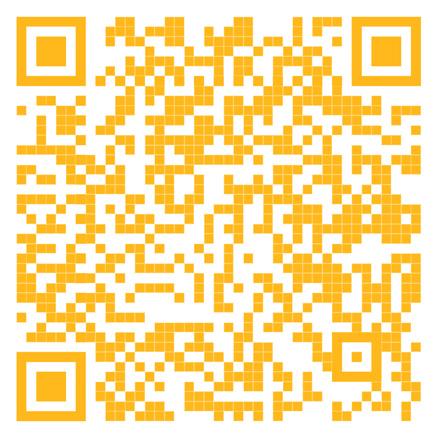

Wichita Collegiate School is proud to be instituting the WCS Fine Arts Hall of Fame. Its aim will be to recognize alumni and esteemed former faculty’s commitment to the growth and development of our WCS Fine Arts Department.



The Circle of Gold endeavors to honor individuals who were the education “architects” of Wichita Collegiate School. Such individuals may have initiated a vision that helped define the school, provided leadership and support that enabled the development of the school, directed broad-based change within the school, or ensured that students were the benefactors of the collective wisdom within the school.


17 SCAN
TO NOMINATE
9115 E. 13th Street | Wichita, KS 67206 (316) 634-0433 | wcsks.com

Non Profit Org U.S. Postage PAID
KS Permit #84
Return Service Requested
Wichita,












 by Charlie Ramseyer
by Charlie Ramseyer






 REGIS FOX
REGIS FOX






 Marilen Morales’ students’ display of multi-media artwork in the upper school commons.
Students in Megan St. Clair’s Fiber Arts class develop work to submit to Scholastic Art & Writing competition.
Marilen Morales’ students’ display of multi-media artwork in the upper school commons.
Students in Megan St. Clair’s Fiber Arts class develop work to submit to Scholastic Art & Writing competition.


















